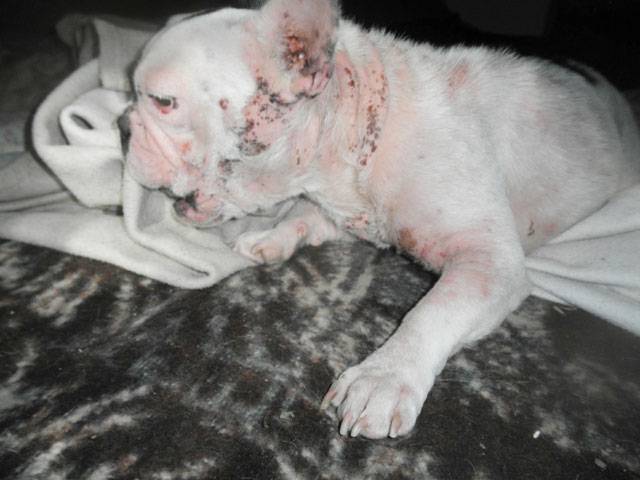PRAGUE-Crammed mercilessly into vans and car boots, tens of thousands of illegally bred dogs, many ill or still puppies, are smuggled each year out of the Czech Republic for sale on western Europe’s lucrative black market.
“Try to live at least one day the way these puppies do, in an unhealthy, isolated place with little food and water, in your own excrement,” says Prague vet Martina Naceradska.
She is one of a growing number of Czech activists targeting so-called puppy mills, or illegal large-scale commercial dog breeding sites, which, they say, ship an estimated 50,000 dogs without identification chips or passports annually to EU nations further west.
Animal rights activists say 100 to 150 puppy mills are thought to be operating in the Czech Republic, many of them on the German and Austrian borders which is a key factor in the illicit trade.
“Dogs are bred illegally in the Czech Republic and other eastern European countries, often in alarming conditions, and then transported to western Europe, where they are handed over to middlemen,” Naceradska told AFP.
Profit margins are hefty. Legally-bred dogs in western EU countries are at least 75 percent more expensive than those illegally bred in their eastern counterparts, according to campaigners.
In the Czech Republic, a boom in illegal breeding in the last few years has driven annual turnover up to around an estimated 1.5 billion koruna (57 million euros, $68 million).
Websites offering popular breeds from Czech puppy mills such as French bulldogs, Chihuahuas, Yorkshire terriers, Jack Russells or the Cavalier King Charles Spaniel, are easy to find online.
Geographical reasons have helped drive the smuggling and aided its success, say animal rights groups.
The Czech Republic has the advantage over Poland, Hungary and Slovakia — where illegal breeding and smuggling to the west also goes on — for example, of sharing large borders with both Austria and wealthy parts of Germany where campaigners highlight a demand.
Buyers often pick up the puppy mill pets from handlers in shady places such as carparks or motorway service areas.
“Demand creates supply,” Naceradska says of the practice, which is relatively recent in the Czech Republic and has even spawned a new Czech word, “mnozirna”, or “breeding factory”.
The booming illegal business has prompted top-selling broadsheet Dnes to dub the EU country of 10.5 million people a puppy mill “superpower”.
The 1992 Animal Welfare Act lays out rules for breeding both farm animals and pets in the Czech Republic, but animal rights activists argue that poor enforcement and weak penalties have created fertile ground for puppy mills.
Being caught transporting an animal or neglecting the rules can entail a fine of up to 768 euros, says Zbynek Semerad, head of the Czech State Veterinary Administration.
But the fine does little to deter illegal breeders, who can earn up to 1,000 euros per puppy for an animal costing around 50 euros to breed.
Illegal breeders can also ensure a steady supply of pups by plying female dogs with hormones and then having them impregnated up to three times a year, according to activists.
“Four out of five puppies die during the transport, for instance to Spain, yet the business still pays off,” says Naceradska, highlighting the high profit margin even after paying the middleman.
Public outcry at home and fierce criticism by animal rights organisations, notably neighbouring Austria’s Vier Pfoten (Four Paws), have forced Czech politicians to act.
In June, parliament amended the veterinary law on rabies vaccination, introducing measures that require all dogs to have electronic ID chips injected under their fur as of 2020.
The amendment also brings in the mandatory registration of any breeding establishment with more than five adult females.
“It’s designed to boost control over dog breeding,” says lawmaker Herbert Pavera, adding that it would soon be necessary to set up a central dog registry too.
“I am convinced it’s possible to eliminate these ‘mnozirnas’, but further legislation will be required,” he added.
But dismissing the legal changes as “better than nothing”, Naceradska argues that more serious legislation, specifically targeting illegal breeders, is needed to stamp them out.
“We must clearly define by law the conditions under which it is forbidden to breed animals, in order to facilitate the prosecution of those breeders,” she said.
Unwilling to wait for lawmakers to take more decisive action, activists like Alena Smidkova are joining forces online via social media to bring illegal puppy mill owners to heel.
The feisty 50-year-old and several friends have become adept at picking out online classified ads that lead them straight to illegal breeders.
“I go with a couple of guys and threaten to call the cops if the boss doesn’t give me his dogs. In most cases, they don’t put up much of a fight,” Smidkova told AFP, as some 20 rescued puppies, including French bulldogs, golden retrievers and Chihuahuas, happily chase each other around her sprawling backyard in the eastern Czech town of Omice.
With the help of friendly vets she cares for pups until they are ready to go to “carefully chosen families” for a symbolic fee of 19 euros, helping to cover some of her costs.






